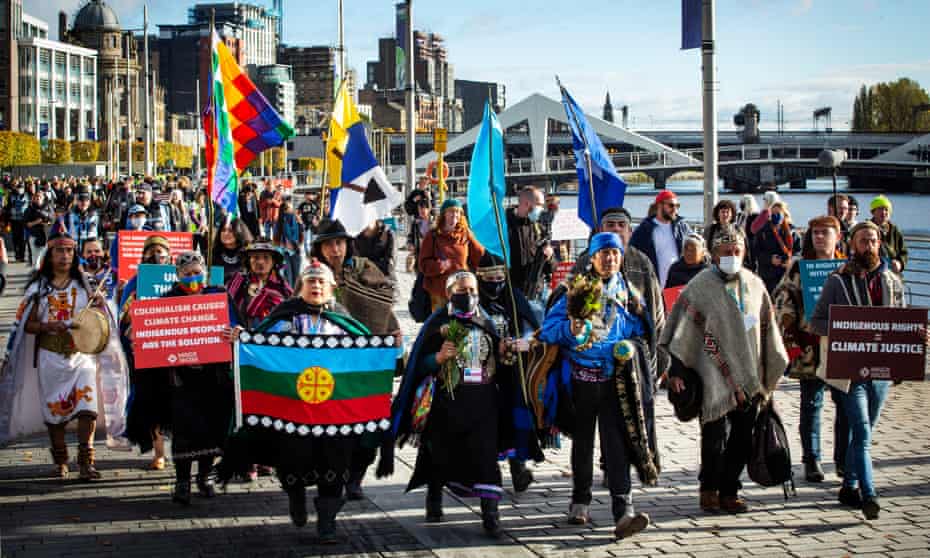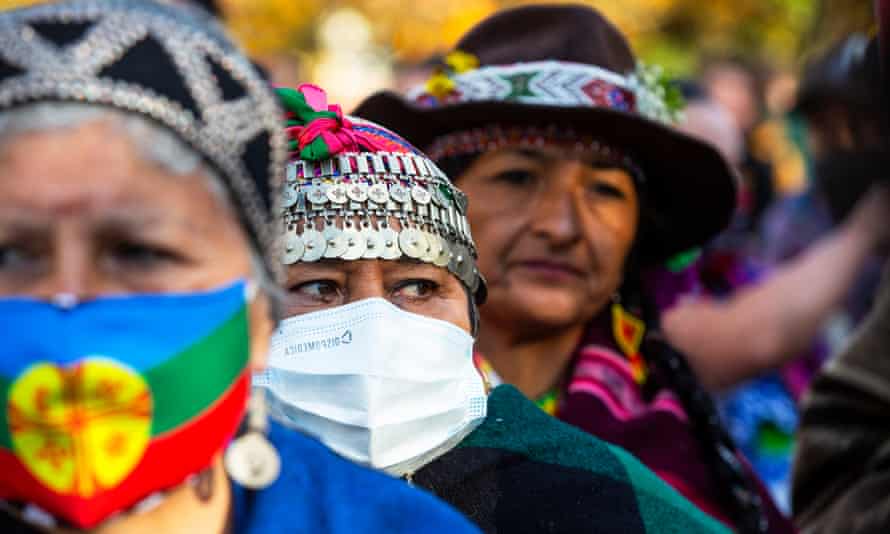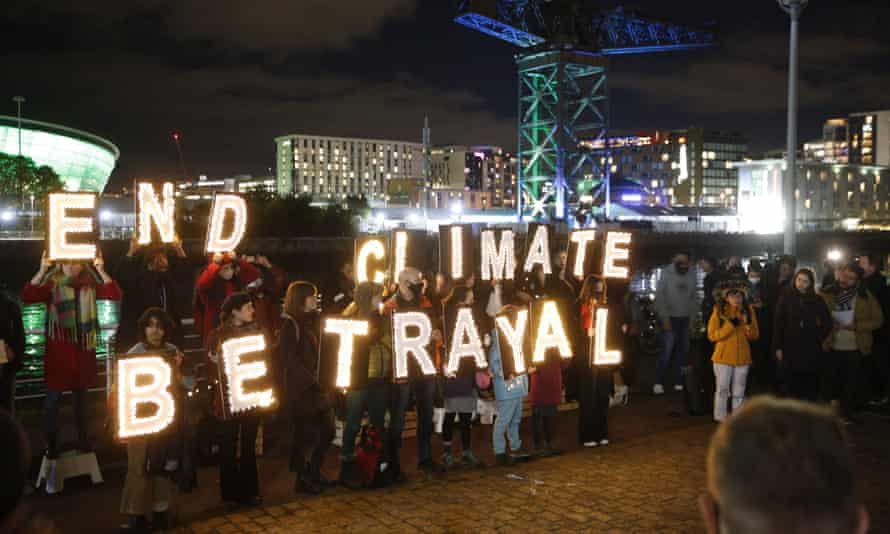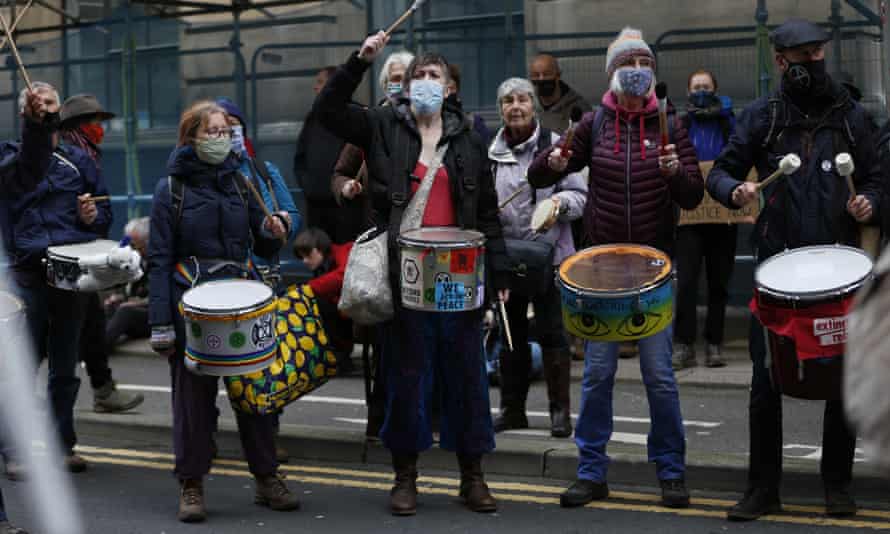Cop26 protesters’ anger and frustration tinged with optimism
While demonstrations have so far been small, there is a feeling among activists that momentum is building

On Tuesday morning, activists dressed in the red jumpsuits familiar to viewers of the dystopian Netflix series Squid Game strike posed for the assembled media on the south bank of the Clyde, directly opposite the Cop26 conference centre.Across the river and further into the city centre later on Tuesday, Anne Thoday was squatting on the pavement on St Vincent Street next to her surdo drum as a thick line of police prevented Extinction Rebellion protesters from moving towards the conference centre.
“I think there are a lot of grandparents involved,” said the 59-year-old social worker, who arrived from Derbyshire on Sunday. “This Cop really does feel like the last chance to turn things around. I’m not feeling very hopeful but I still felt compelled to come here.”

This modest gathering – about 100 protesters – was typical of a smaller-than-expected protest presence so far at Cop26. No one is quite sure why, although anxiety about coronavirus is certainly playing a part. Activists argue, however, that it is also the result of exclusionary structures that go well beyond concerns about Covid transmission.
Joe Karp-Saway, of Global Justice Now, said people had been put off by Covid, “but also the huge cost of travel and accommodation to Glasgow and miscommunication from the UK government and UNFCCC [the United Nations framework convention on climate change], which means there are fewer civil society groups from the global south.”
He noted that these early days were just the start of actions that would be spread across the fortnight, as well as the larger mobilisations planned for this weekend when up to 100,000 people are expected to march in Glasgow, and similar demonstrations will take place across the UK and around the world.
The XR activists moved off again carrying a pink lettered banner reading: “How many Cops to arrest climate chaos?” When they arrived outside the venue later in the afternoon, the police closed the Clyde Arc, preventing protesters from continuing their march but also stopping other visitors who needed to get to events around the green zone across the river. The walk to the nearest open footbridge and back would take at least an hour.
Inside the conference centre, Fatima Ibrahim, of Green New Deal Rising, was finding it hard to share Boris Johnson’s cautious optimism about the summit. There was frustration and weariness among activists, she said. “People are tired of rhetoric and false promises.” The policing seemed heavy-handed to her. “I’ve not seen protesters greeted by police in the same way at previous Cops, while civil society is locked out of spaces within the blue zone.”

For those who made it across the river, youth and indigenous activists had gathering for speeches and another photocall, holding up illuminated letters spelling out “End Climate Betrayal”.
In her speech, Mitzi Tan, a convener of Fridays For Future for the Philippines, sounded angry – the leaders aren’t in there, she gestured across the river, they are in front of her, she told the small crowd, to hearty cheers.
The mood among activists was angry, the 24-year-old from Manila agreed afterwards. “It’s only been the second day but I’ve already heard so many excuses.”
Having arrived in Glasgow on Sunday, she had been attending back-to-back events and meetings. “I have no sense of time,” she laughed, admitting she’d started taking vitamin D supplements “because I miss the sunlight so much”.

It was as important to be in Glasgow to build networks as to protest, she said. “One of the best feelings is meeting people from across the globe and hugging each other, because we’ve been organising together online for a year and some of us have never met in person.”On Wednesday morning Ibrahim and her team challenged the UK chancellor, Rishi Sunak, about why there was no mention of the climate in his recent budget, as he walked through the conference blue zone. His team demanded that they be removed before he addressed the plenary.
For Green New Deal Rising this fortnight is also geared towards training up new activists: it will welcome 100 young people from across the UK to its hub at a warehouse in the east end of Glasgow. While the immediate momentum is building up to the weekend’s marches, “really what we are working towards is how to keep [leaders] accountable after 12 November”.
At lunchtime on Wednesday, Extinction Rebellion convened again for a protest against corporate green-washing in the city centre. As the drums boomed out, activists remarked on the swelling crowd of 300 or more, suggesting protest numbers were increasing as the week progressed.
Meanwhile, outside the conference hall, indigenous activists were converging after a march from Glasgow Green.
Txai Surui, the daughter of a tribal chief from the Brazilian Amazon, had delivered an eloquent appeal to the conference on Monday, telling delegates: “The Earth is speaking. She tells us that we have no more time.” The 24-year-old has been wearing the bird feather headdress made for her by her father and uncle, fashioned “for going into battle” she said.
Looking ahead to the weekend’s marches, she urged people around the globe to participate. “Everybody should go to these marches, to show the power and strength of all the people in this fight. This is going to be a moment for us to send a message that they cannot do whatever they want, because the power is with the people.”

